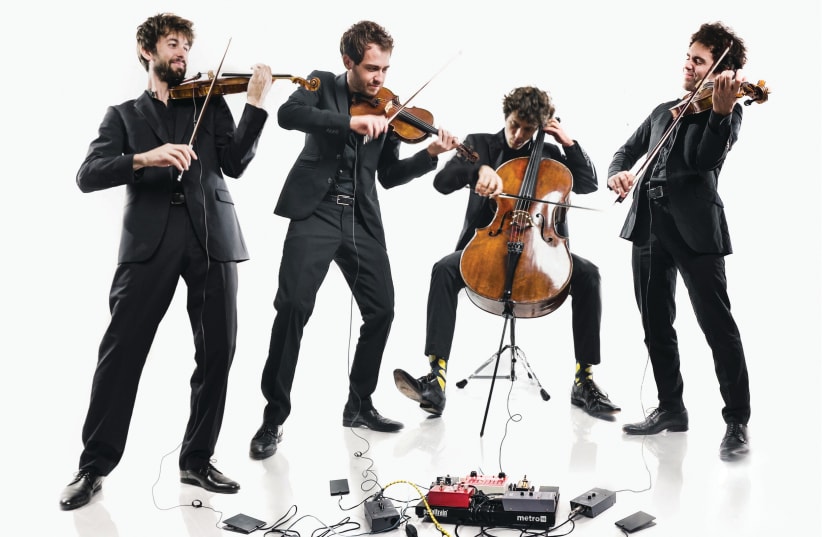Ever sat in a concert hall watching a string quartet going at a work by, say, Beethoven or Brahms, hammer and tongue? Yes, the rendition may be spot on, or even moving, but it’s a fair bet the instrumentalists don’t have a beatific smile plastered across their faces. They may be enjoying themselves but you’d be hard-pressed to sense that.
The Vision Quartet take an entirely contrary approach to their music-making. The German foursome is heading this way later this week, to participate in the annual Eilat Chamber Music Festival, which takes for the seventeenth time, down at our southernmost resort, from February 8-11.
The ensemble has made a couple of previous visits to this country but, if you haven’t caught their act thus far and are planning on heading south for the festival later this week, it is fair to say that you probably haven’t witnessed anything quite like it before.
How do the Vision Quartet sound?
To describe the quartet as versatile would be to damn them with faint praise. You could say the four members are energetic, madcap, vivacious, irrepressible, farcical, dynamic, exciting and – yes – excellent musicians. While they do justice to works by the likes of Beethoven, Schubert and Mendelssohn, you can just as easily find them pumping out rock-laced sounds, funk or pop, and they also stray into folk, gypsy, Latin American and minimalist climes.
Since its founding in 2012, the Berlin-resident string players – violinists Florian Willeitner and Daniel Stoll, cellist Leonard Disselhorst and viola player Sander Stuart – have toured, wowed and wooed audiences all over the world with their eclectic repertoire of sounds, genres and rhythms spread across diverse visually compelling formats.
“It is actually quite easy. We don’t just listen to classical music. I listen more to pop music and rock music, than to classical music, because I do that for my day job.”
Sander Stuart
I wondered how the thirtysomething Berliners had arrived at such an envelope-pushing entertaining concept. Stuart says that, classical education notwithstanding, all four players are also a product of their generation and time. “It is actually quite easy. We don’t just listen to classical music. I listen more to pop music and rock music, than to classical music, because I do that for my day job,” he chuckles. “I also like to play drums, and bass and guitar. I loved playing in bands when I was at school.”
It is a matter of fusing personal tastes and inclinations and enjoying the best of all worlds. “We all dreamed of connecting that with our job,” Stuart explains. “We are all classically trained, since the age of five or six, like all classical musicians normally do.”
It was a coming together of like minds and, it must be said, a generous helping of talent and letting loose with the personal chemistry. “We all randomly met at university, or in the street. We met in composing classes and rhythm classes, and we somehow met in Hanover, where most of us come from.”
It was a creative venture from the start. “We came together not so much to play classical music, but more to compose together. We actually started as a sextet, with a double bass and another violin, but the logistics were too difficult, like finding a room for rehearsals for six players and finding a time that was good for everyone, and that sort of thing.” And so the quartet came to be.
It wasn’t just a matter of managing the practicalities. “We love the quartet genre,” Stuart notes. “It’s minimalistic but you have everything you need. There’s a bass, you have the melody, and you have two mid-strings,” he says, referencing the registers of the viola and the cello, which stretch lower than the violin. “We started composing for this kind of ensemble.”
The four were also intent on having fun themselves and spreading the feel-good vibe to their audiences. “We just figured out that it is also satisfying to see younger people at the concert, or people being interested in classical quartets even though they are not interested in classical music.”
That is also a product of an oft-used Vision Quartet performance format, whereby the concert is typically a tale of two halves – one classical, and the other more visually and sonically diverse, entertaining, contemporary and young user-friendly. “Young people have come up to us after a concert like that and said: ‘Actually, the classical music was not too bad.’ That is like the biggest compliment you can get,” Stuart laughs.
IT IS NOT always about mixing things to bring in the crowds, with concerts often sticking solely to either classical or more varied contemporary, scores. But one can say that Vision definitely sets out to please.
The quartet makes every effort to engage the paying customer, including by virtue of the simple fact that they don’t hide behind the sheet music. “Even when we play classical music, we stand and play by heart,” Stuart explains. “That’s a different kind of presentation, like a normal [rock or pop] band.
“We normally play by heart because we play the music so often. And we love the idea of people just looking at us, and not looking at us looking at the scores. You get a deeper connection to the people.”
They even make some eye contact with their listeners which, it transpires, presents its own – surprising – challenges. “It’s like a cleaner look, a cleaner experience. The people in the audience can look into our faces. And we can look back.
“Sometimes it is really difficult [for the musicians] not to look at people. Actually, I am not sure if it is really comfortable for people sitting in the audience seeing musicians looking at them. We have to be careful,” Stuart laughs. Presumably, he and his pals don’t want to draw us too far out of our comfort zone, but I hope they won’t be too cautious about that down in Eilat.
Over the years the quartet has tried its skilled hands at a very wide range of materials. A spin of the ensemble’s 2021 album, Spectrum, spells that out in no uncertain terms. “Sailor,” for example, is a jolly jaunt of a number, with Celtic, folksy, bluesy and jazzy vignettes deftly intertwined, while “Shoemaker” is a delightfully choreographed percussive piece. All the numbers on the record were written and arranged by the players themselves.
Vision opens the festival proceedings, at 5 p.m. on February 8, with a program of romantic works by Bloch, Shostakovitch and Mendelssohn, with the quartet letting its hair down in the same slot on the morrow with a show based on material from Spectrum. Musical base differences notwithstanding, both should be rewarding and entertaining experiences.
For tickets and more information: (08) 644-4816, (08) 637-7036 and www.eilat-festival.co.il












